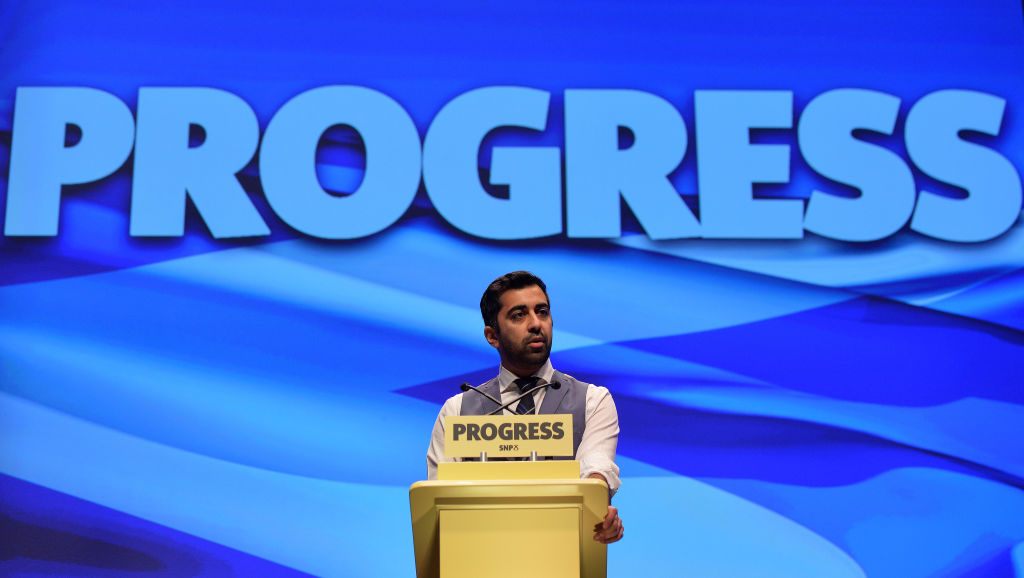The SNP has, until recently, looked unassailable. But amidst the drama surrounding the Alex Salmond inquiry, could a backlash to one of the party’s headline policy proposals sink the unsinkable?
Opposition to the SNP’s proposed hate speech law is clearly growing. The Holyrood government assumed that pushing through the hate speech component of its Hate Crime and Public Order Bill, published in April 2020, would be plain sailing. It would probably attract the middle-class progressives who traditionally supported the SNP; it also looked fairly easy to sell to ordinary Scots as a technical updating of the law inspired by a carefully-drafted official report from a Court of Session judge. Any opposition from free speech supporters could no doubt be waved away as the rantings of a few unworldly enthusiasts. As a result, Justice Minister Humza Yousaf took the Bill seriously, and was in no mood to compromise.
Holyrood badly misjudged. Any intelligent person could see at a glance that the proposals were a monstrosity.
It takes quite something to persuade the Catholic Church to make common cause with the National Secular Society
They added greatly to the privileged groups protected from disrespectful references. They also criminalised speech on the basis, not of any intent to foment hatred, but of a mere propensity to do so. The possession of certain literature could have been effectively outlawed, with the police given powers to search people’s homes for offending material.
These proposals could potentially have made the production of plays illegal if any character in them expressed unacceptable prejudices. To make matters worse, there was no attempt to protect speech taking place within people’s homes. Honest discussion of disability, mental health and sexuality, could have been affected.
To the SNP’s dismay, its proposals attracted almost no enthusiasm and almost universal condemnation. It takes quite something to persuade the Catholic Church to make common cause with the National Secular Society, and the Faculty of Advocates with the Scottish Police Federation and the Free Speech Union; but the SNP succeeded in doing just this.
Holyrood attempted damage limitation, but without success. Last September, Humza Yousaf tried through gritted teeth to buy off the opposition by removing the provisions criminalising speech on account of mere propensity to foment hatred, instead requiring proof of intent to do so. But this was not enough. In the parliamentary Justice Committee scrutinising the Bill, the government has, in the last few weeks, been constrained to excise a great deal more.
Gone are its entire proposals relating to performances of plays, and also those affecting possession of inflammatory materials. In the original Bill, conduct intended to foment hatred had only to be seen as ‘abusive, threatening or insulting’ by a possibly over-sensitive witness in order to be criminal; now, it has to have that effect on a reasonable person. To the disgust of several noisy pressure groups, explicit protection for robust, even offensive, criticism of transgender rights has been imposed.
These latest changes are due for formal approval at a Justice Committee vote on Tuesday. Given that they are backed by the government, they are likely to be nodded through.
There is a further important, and sensible, proposal from Tory MSP Liam Kerr to introduce a protection for events taking place entirely within a single dwelling, a provision already existing in England. Whether Holyrood will choose to dig its heels in on this issue and court the ire of numerous moderate Scots is uncertain. Unfortunately, it may well do this, if only to show that, at least for the moment, it is still in charge.
But the damage to the SNP’s credibility has been done. The now hollowed-out hate speech proposals are very close to Hamlet without the prince, or perhaps Macbeth without the king. Essentially all we have left is this: a narrow, if still worrying, set of proposals to outlaw the intentional stirring-up of hatred against a rather arbitrary collection of protected groups.
Some Scots, especially those who value freedom of speech, might think it better at this point to give up and abandon the whole exercise. Rationally this is probably what the SNP should do. One suspects, however, that Nicola Sturgeon and Humza Yousaf have too much political capital invested in the project to do this, and will limp on with the simulacrum they have left.
There is another, much more important, point to draw from this debacle. Until now, despite its increasing authoritarianism – not to mention its questionable efforts at tackling Covid-19 and the Salmond affair that will not go away – it has been fashionable to talk of the SNP as some kind of unstoppable political tank, still advancing towards Indyref 2 and tossing aside all obstructions. What may well worry Nicola Sturgeon about the hate speech affair is that, despite the SNP’s clear commitment, her bluff has been successfully called.






Comments